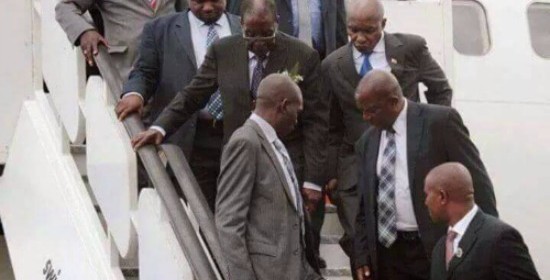- DISGRUNTLED Zimbabwe police stage uniform protest.
- MNANGAGWA wife Auxillia drops charges against nine women who boed her in Manicaland
- O.J. Simpson dies of cancer , aged 76.
- South Africa ANC is the cause of ZIMBABWE troubles claims Zimbabwe opposition politician Job Sikhala
- SIKHALA says he is prepared to die freeing the people of Zimbabwe from the shackles of economic poverty.
Vascoda Mugabe’s Foreign Travel Budget, Exceeded By 240%

THE government overspent by 25 percent in the eight months to August, with the cost of foreign travel skyrocketing, while revenue collection missed targets due to poor economic performance, a report by a think tank has shown.
A frequent flier, President Robert Mugabe is regularly criticised by the opposition for spending millions travelling abroad at a time the Harare administration is struggling with its finances in a poor economy.
The veteran leader’s foreign travel schedule increased this year after his appointment as chairman of the African Union (AU) and the regional SADC grouping.
He recently returned from Turkey where he attended the G20 summit and is expected to soon leave for France for United Nations climate talks.
After that he will likely attend a two-day China-Africa forum in neighbouring South Africa early next month.
Finance minister, Patrick Chinamasa, presents his 2016 budget to Parliament on Thursday.
The government ran a budget deficit of $240 million after expenditure amounted to $2,54 billion against revenue of $2,3 billion, according to a report by the Zimbabwe Economic Policy Analysis and Research Unit (Zeparu) released on Wednesday.
Foreign travel expenses exceeded budget by nearly 240 percent while employment costs and capital works overshot the target by 16 percent and 23 percent, respectively.
To plug the gap, government used a combination of a rare surplus from the previous quarter and domestic loans and treasury bills amounting to $171,3 million.
Tight liquidity
Recurrent expenditure at 94 percent was 16,4 percent higher than the target, Zeparu noted.
Revenue collection was getting worse after falling behind target by $208,1 million — 4,2 percent below last year’s figures for the same period underpinned by low industrial capacity utilisation, company closures and depressed consumer demand.
“Tight liquidity conditions, which have manifested in decelerating money supply growth and high interest rates, have continued to depress economic activity through limiting consumption and investment,” said Zeparu.
The continued free fall in commodity prices had hit the mining sector hard and affected its contribution to economic activity, it noted.
Gold deliveries rose by 34,2 percent to 13,211kilogrammes — anchored by a 115 percent increase in deliverances by artisanal miners — about three quarters of the target of 17,500kg.
But mineral earnings for the nine months to September — excluding diamond revenue — fell 11 percent to $1,26 billion with gold, platinum, palladium and nickel contributing 85 percent to the total earnings.
Zeparu said inflation, which closed at -3,29 percent in October, is likely to edge to -1,87 percent in December.
“The government has taken action to tackle deflation. For example, it has put into place measures to reduce imports by removing basic goods from travellers rebate and banning the importation of second-hand clothes,” said Zeparu.
“This is likely to impose some level of upward pressure on the inflation rate, as these were exerting high levels of competition on domestic producers,” it added, noting however, that the measures were not enough to break the economy out of deflation.source-newzimbabwe